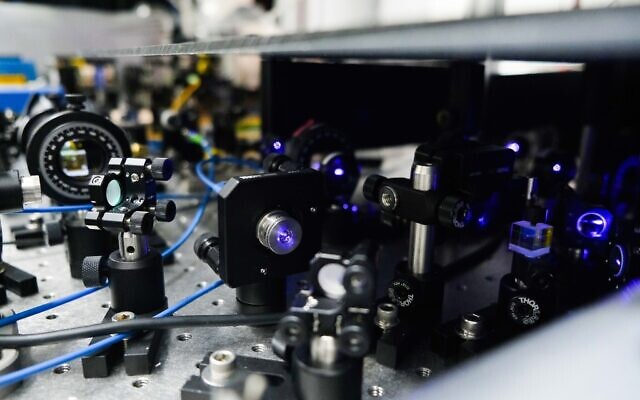Japanese automotive giant Toyota has tapped Israeli company Quantum Machines, through its trading arm Toyota Tsusho Corporation, for a partnership that will build future quantum capabilities and offer the multinational’s Japanese customers access to quantum technologies, the parties said this week.
Founded in 2018 by award-winning quantum electronics experts Dr. Itamar Sivan, Dr. Yonatan Cohen and Dr. Nissim Ofek, Quantum Machines built the Quantum Orchestration Platform (QOP), a hardware and software solution for operating quantum systems to facilitate research and enable future breakthroughs.
It also developed the QUA, a standard universal language for quantum computers that the startup says will allow researchers and scientists to write programs for varied quantum computers with one unified code.
When announcing its $50 million investment round last September, Quantum Machines said that it already provides control and orchestration systems for quantum computing to customers in 15 countries, including multinational corporations, government laboratories, academic institutions, and quantum development startups.
Sivan told The Times of Israel via email that the new partnership will allow Toyota Tsusho to offer its customers Quantum Machines’ flagship OPX+ solution, which he described as a “hardware system developed from the ground up for quantum and designed to meet the extremely demanding requirements of quantum control protocols, including precision, timing, complexity, and ultra-low latency.”
The solution “will allow for control of quantum computing hardware using QUA, a flexible high-level programming language that allows quantum practitioners to intuitively program even the most complex quantum programs,” he explained.
“Access to QM’s state-of-the-art quantum control system will enable Toyota Tsusho’s customers to develop in-house quantum computing capabilities. The advantage of QM’s solution is that it covers much of the stack, including both software and hardware. This highly integrated approach will make it far easier for organizations with quantum aspirations to develop fully functioning quantum computers,” added Sivan.
Quantum computing is a relatively new and extremely complex field, but experts say that quantum computing can be extremely beneficial in industries like cybersecurity, materials and pharmaceuticals, banking and finance, and advanced manufacturing, and may lead to massive developments in broad fields like economics, security, engineering, and science.
Quantum computing harnesses quantum mechanics to quickly solve problems that are too complex for classical computers. Quantum computers process exponentially more data compared to classical computers, using quantum bits, or qubits, the basic unit of quantum information.
Whereas classical computers carry out logical operations based on one of two positions — 1 or 0, on or off, up or down — quantum computers can keep qubits in “superposition,” a principle of quantum mechanics where they are both simultaneously. In this state, quantum computers “can crunch through a vast number of potential outcomes simultaneously,” according to an MIT Technology Review explanation.
These computers also work through a concept called entanglement, where pairs of qubits exist in a single quantum state. “Quantum computers harness entangled qubits in a kind of quantum daisy chain to work their magic. The machines’ ability to speed up calculations using specially designed quantum algorithms is why there’s so much buzz about their potential,” according to the magazine.
Tech giants like Google, Microsoft, IBM, and Intel are all racing to make quantum computing more accessible and build additional systems.
An illustrative photo of IBM’s Quantum System One, the world’s first integrated quantum computer system. (IBM)
According to recent market projectionsthe global quantum computing market size is expected to grow from about $470 million in 2021 to about $1.765 billion by 2026.
Countries like China, the US, Germany, India, and Japan are also pouring millions into developing their own quantum abilities.
Japan first rolled out its Quantum Technology and Innovation Strategy in 2020, launching eight R&D centers to accelerate research the following year. Earlier in 2022, the Japanese government announced a new plan to bring into service the country’s first homegrown quantum computer by March 2023.
The vision “aims for society’s positive evolution by embedding quantum technology throughout social and economic systems, which will create opportunities for industrial growth and a carbon-neutral society, as well as addressing social issues such as those raised by the SDGs [Sustainable Development Goals as defined by the United Nations in 2015],” the government said.
the amount of Israeli advances
In March, an Israeli team of researchers led by Prof. Roee Ozeri of the Weizmann Institute of Science announced that they have built the country’s first quantum computera major feat that has been years in the making.
The device is one of about 30 quantum computers in the world in different stages and one of fewer than 10 that use ion traps, an advanced technology that confines ions (molecules with a net electrical charge) in a small space using magnetic or/and electric fields. Trapped ions can form the basis of quantum bits, or qubits, the basic unit of quantum information.

Optical elements required to create laser pulses that can control trapped ions. (Freddy Pizanti)
In February, the Israeli Innovation Authority and the Defense Ministry said they will spend approximately NIS 200 million ($62 million) to develop a state quantum computer and lay the foundation for Israeli computational ability in the field.
The budget will fund two parallel avenues. The Israel Innovation Authority will focus on developing the infrastructure for quantum computational ability. The Defense Ministry’s Directorate of Defense Research and Development (DDR&D), meanwhile, will establish a national center with quantum capabilities that will work with academia, industry, and government partners to develop a quantum processor and then a complete quantum computer.
The initiative is part of the 2018 launch of Israel’s National Quantum Science and Technology Program with a budget of NIS 200 million, later expanded to NIS 1.25 billion ($390 million). The program was initiated to facilitate relevant quantum research, develop human capital in the field, encourage industrial projects, and invite international cooperation on research and development.
